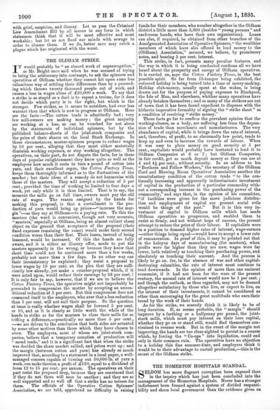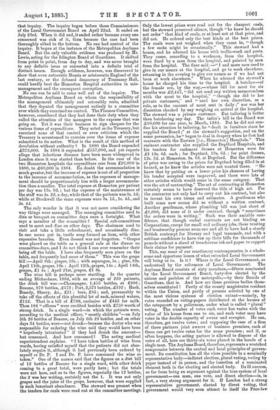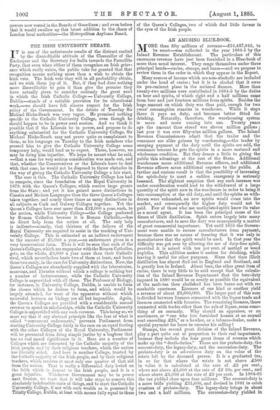THE HOMERTON HOSPITALS SCANDAL.
SELDOM has more flagrant corruption been exposed than in the inquiry which has just been concluded into the management of the Homerton Hospitals. Never has a stronger indictment been framed against a system of divided responsi- bility and sham local government than the evidence given on
that inquiry. The inquiry began before three Commissioners of the Local Government Board on April 22nd. It ended on July 23rd. When it did end, it ended rather because every one concerned was sick of it, than because the case had been thoroughly sifted to the bottom. No one had control of the inquiry. It began at the instance of the Metropolitan Asylums Board. But the only valuable evidence was produced by Mr. Lewis, acting for the Islington Board of Guardians. It shifted from point to point, from day to day, and was never brought to any definite issue or converted into a definite trial of distinct issues. Enough evidence, however, was discovered to show that even autocratic Russia or aristocratic England of the last century, or the debased democracy of Tammany Hall, could hardly beat the Homerton Hospital authorities in mis- management and the consequent corruption. No one can be said to come well out of the inquiry. The Metropolitan Asylums Board on whom the responsibility of the management ultimately and ostensibly rests, admitted that they deputed the management entirely to a committee over which they exercised no control. The Finance Committee, however, considered that they had done their duty when they called the attention of the managers to the expense that was going on. Yet it was their business to sign cheques for the various items of expenditure. They acted as the Treasury, but exercised none of that control or even criticism which the Treasury is accustomed to exercise over the items of expense submitted to its notice. What is the result of this method of devolution without authority ? In 1880 the Board expended £373,000. In 1884 it expended £557,000, and yet experts allege that infectious diseases have been more widespread in London since it was started than before. In the case of the two Homerton hospitals the expenditure rose from £26,000 in 1880, to £60,000 in 1884. No doubt the accommodation is much greater, but the increase of expense is out of all proportion to the increase of accommodation, as the expenses of manage- ment should be proportionately less with a larger accommoda- tion than a smaller. The total expense at Homerton per patient per day was 13s. 9d. ; but the expense of the maintenance of the staff was 4s. 2d. a day, while that of the patients was 3s. 1d; while at Stockwell the same expenses were 8s. id., is. 4d., and 35. 4d.
The only wonder is that it was not more considering the way things were managed. The managing committee used to dine or banquet on committee days once a fortnight. What says a member of the committee ? Special sub-committees used to meet and dine on other days. The chairman used to visit and take a little refreshment, and occasionally dine. In one menu put in, turtle soup formed an item, with other expensive luxuries. Even dessert was not forgotten. "Grapes were placed on the table as a general rule at the dinner on committee-days, and I do nct think I can ever remember their being off the table. I have also frequently seen pines on the table, and frequently had some of them." This was the grape bill :—April 9th : grapes, 16s.; with asparagus, Se.; pine, 10s. April 11th, grapes, 16s.; April 12th, grapes, 14s.; April 14th, grapes, £1 4s. ; April 21st, grapes, £1 8s.
The wine bill is perhaps more startling. In the quarter ending Michaelmas, 1884, with an average of 239 patients, the drink bill was :—Champagne, 1,455 bottles, at £206; Beaune, 970 bottles, £172; Port, 2,571 bottles, £192; Hock, Brandy, Sherry, &c., £21; beer, £85; and, presumably to take off the effects of this plentiful lot of sack, mineral waters, £112. That is a bill of £788, exclusive of £443 for milk. Then 184 "officers" were credited besides with £750 worth of strong drink. In a single ward—in which the patients were, according to the medical officer, "mostly children "—on July 5th 26 bottles of Beaune, on July 6th 29 bottles, and on other days 34 bottles, were—not drunk—because the doctor who was responsible for ordering the wine said they would have been "hopelessly intoxicated" if they had drunk the amount— but consumed. And how consumed ? The acting medical superintendent explains. "I have taken bottles of wine from wards, having satisfied myself that the patients did not abso- lutely require it, although it had previously been ordered by myself or Dr. P. I and Dr. P. have consumed the wine so taken." One of the nurses said that the figures on a diet bill of 12 bottles of Beaune for a single ward, with other drink coming to a great total, were partly hers ; but the totals were not here, and as to the figures, especially the 12 bottles, the 2 was her writing, certainly not the 1. It was not only grapes and the juice of the grape, however, that were supplied in such luxuriant abundance. The steward was present when the tenders for coals were read out at the committee meetings.
Only the lowest prices were read out for the cheapest coals, but the steward preserved silence, though "he knew he should not order" that kind of coals, or at least not at that price, and did not. He ordered only the best kinds at the best prices. The coals were not weighed when they came in, "though a few sacks might be occasionally." This steward had a house, and he adorned his house with trellis-work and posts. They came, according to a workman, from the hospital, were fixed by a man from the hospital, and painted by men from the hospital. The fixer said :—" I and more men used to give in our names at the hospital, and go to work elsewhere, returning in the evening to give our names as if we had not been at work elsewhere." When he adorned the steward's house he charged his time to the hospital. A butcher—of the female sex, by the way,—whose bill for meat for six months was £2,447, "did not send any written memorandum with the meat to the hospital," "though she did to her private customers," and " used her own discretion, as a rule, as to the amount of meat sent in daily ;" nor was her discretion checked by any weighing on arrival at the hospital. The steward was a private customer. But tailoring is better than butchering any day. The tailor's bill to the Board was £10,000 for one year, to March, 1884. But he did not con- fine his attention to tailoring, he "dealt in furniture since he supplied the Board ;" at the steward's suggestion, and on the same persuasion, he" began to deal in drapery when he first had contracts with the Eastern [i.e., Homerton] Hospitals." This eminent contractor also supplied the Deptford Hospitals, and his tenders for cashmere dresses at Homerton were for Li 19s. 6d. each ; for Deptford, 19s. 6d. ; for print dresses, 12s. 3d. at Homerton, 8s. 6d. at Deptford. But the difference of price was owing to the prices for Deptford being filled in at hazard, as he knew the articles were not wanted there. "He knew that by putting on a lower price his chances of having his tender accepted were improved, and there were lots of other articles which would come in the same category. That was the art of contracting." The art of contracting at Homerton certainly seems to have deserved the title of high art. For the contractor not only had to carry out his contract, but also to invent his own terms and estimates. A gentleman who built some new rooms did so without a written contract. Another gentleman, whose plumbing bill was just short of £1,000, did none of it under contract, though "sometimes the orders were in writing." Such was their amiable con- fidence, that though verbal contracts are not binding on Corporations, except for small and ordinary jobs, these trusting and trustworthy persons seem one and all to have had a sturdy British contempt for literary and legal trammels, and with a sublime confidence to have run up their bills for thousands of pounds without a shred of treacherous ink and paper to support their claims for payment.
This, say some of our reactionary contemporaries, is a whole- some and opportune lesson of what extended Local Government will bring us to. Is it ? Where is the Local Government, as understood by the reformers of Local Government. The Asylums Board consists of sixty members,—fifteen nominated by the Local Government Board, forty-five elected by the unions and parishes of the metropolis,—by their Boards of Guardians, that is. And how are these precious bodies them- selves constituted ? Partly of the county magistrates resident within the Union, and partly of persons selected by one of the most vicious systems of election extant—namely, by votes recorded on voting-papers distributed at the houses of the ratepayers by a policeman, under what is called "plural" voting. The number of votes each voter has varies with the value of his house from one to six, and each voter may have votes in the double capacity of owner and occupier. He can, therefore, get twelve votes ; and supposing the case of a firm of three partners joint owners of business premises, each of them can get twelve votes for the same premises ; and if, as often happens, the acting partner is allowed to dispose of the votes of all, here are thirty-six votes placed in the hands of a single man. The Asylums Board, therefore, represents a wretched compromise between the central and local principles of govern- ment. Its constitution has all the vices possible to a nominally representative body—indirect election, plural voting, voting by paper instead of in person, and the insertion of a nominated element both in the electing and elected body. Its ill success, so far from being an argument against the true system of local government—one man, one vote, and direct election—is, in fact, a very strong argument for it. If London had a strong representative government, elected by direct voting, that government would very soon attract to itself the Poor-law powers now vested in the Boards of Guardians ; and even before that it would swallow up this latest addition to the chaos of London local authorities—the Metropolitan Asylums Board.




































 Previous page
Previous page